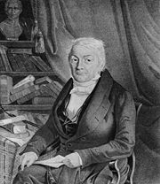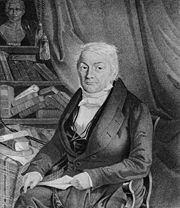
Johann Caspar von Orelli
Encyclopedia

Switzerland
Switzerland name of one of the Swiss cantons. ; ; ; or ), in its full name the Swiss Confederation , is a federal republic consisting of 26 cantons, with Bern as the seat of the federal authorities. The country is situated in Western Europe,Or Central Europe depending on the definition....
classical scholar.
He was born at Zürich
Zürich
Zurich is the largest city in Switzerland and the capital of the canton of Zurich. It is located in central Switzerland at the northwestern tip of Lake Zurich...
of a distinguished Italian family which had taken refuge in Switzerland at the time of the Protestant Reformation
Protestant Reformation
The Protestant Reformation was a 16th-century split within Western Christianity initiated by Martin Luther, John Calvin and other early Protestants. The efforts of the self-described "reformers", who objected to the doctrines, rituals and ecclesiastical structure of the Roman Catholic Church, led...
. His cousin, Johann Conrad Orelli (1770–1826), was the author of several works in the department of later Greek literature
Greek literature
Greek literature refers to writings composed in areas of Greek influence, typically though not necessarily in one of the Greek dialects, throughout the whole period in which the Greek-speaking people have existed.-Ancient Greek literature :...
.
From 1807 to 1814 Orelli worked as preacher in the reformed community of Bergamo
Bergamo
Bergamo is a town and comune in Lombardy, Italy, about 40 km northeast of Milan. The comune is home to over 120,000 inhabitants. It is served by the Orio al Serio Airport, which also serves the Province of Bergamo, and to a lesser extent the metropolitan area of Milan...
, where he acquired the taste for Italian literature
Italian literature
Italian literature is literature written in the Italian language, particularly within Italy. It may also refer to literature written by Italians or in Italy in other languages spoken in Italy, often languages that are closely related to modern Italian....
which led to the publication of Contributions to the History of Italian Poetry (1810) and a biography (1812) of Vittorino da Feltre
Vittorino da Feltre
Vittorino da Feltre was an Italian humanist and teacher. He was born in Feltre, Belluno, Republic of Venice and died in Mantua. His real name was Vittorino Ramboldini....
, his ideal of a teacher.
In 1814 he became teacher of modern languages and history at the cantonal school at Chur
Chur
Chur or Coire is the capital of the Swiss canton of Graubünden and lies in the northern part of the canton.-History:The name "chur" derives perhaps from the Celtic kora or koria, meaning "tribe", or from the Latin curia....
; in 1819, professor of eloquence and hermeneutics at the Carolinum in Zürich, and in 1833 professor at the new University of Zürich
University of Zurich
The University of Zurich , located in the city of Zurich, is the largest university in Switzerland, with over 25,000 students. It was founded in 1833 from the existing colleges of theology, law, medicine and a new faculty of philosophy....
, the foundation of which was largely due to his efforts. His attention during this period was mainly devoted to classical literature and antiquities. He had already published (1814) an edition, with critical notes and commentary, of the Antidosis
Antidosis
Antidosis , is the title of a speech treatise by the ancient Greek rhetorician, Isocrates. The Antidosis can be viewed as a defense, an autobiography, or rhetorical treatise. However, since Isocrates wrote it when he was 82 years old, it is generally seen by some people as an autobiography...
of Isocrates
Isocrates
Isocrates , an ancient Greek rhetorician, was one of the ten Attic orators. In his time, he was probably the most influential rhetorician in Greece and made many contributions to rhetoric and education through his teaching and written works....
, the complete text of which, based upon the manuscripts in the Ambrosian and Laurentian libraries, had been made known by Andreas Mustoxydis
Andreas Mustoxydis
Andreas Mustoxydis, sometimes spelled as Andrea Mustoxidi was a Greek historian and philologist from Corfu.He studied at Pavia, and in 1804 published a treatise on the history of Corfu titled Notizie per servire alla storia Corcirese dai tempi eroici al secolo XII. This publication led to...
of Corfu
Corfu
Corfu is a Greek island in the Ionian Sea. It is the second largest of the Ionian Islands, and, including its small satellite islands, forms the edge of the northwestern frontier of Greece. The island is part of the Corfu regional unit, and is administered as a single municipality. The...
.
The three works upon which his reputation rests are the following:
- A complete edition of CiceroCiceroMarcus Tullius Cicero , was a Roman philosopher, statesman, lawyer, political theorist, and Roman constitutionalist. He came from a wealthy municipal family of the equestrian order, and is widely considered one of Rome's greatest orators and prose stylists.He introduced the Romans to the chief...
in seven volumes (1826–1838). The first four volumes contained the text (new ed., 1845–1863), the fifth the old Scholiasts, the remaining three (called Onomasticon Tullianum) a life of Cicero, a bibliography of previous editions, indexes of geographical and historical names, of laws and legal formulae, of Greek words, and the consular annals. After his death, the revised edition of the text was completed by JG BaiterJohann Georg BaiterJohann Georg Baiter was a Swiss philologist and textual critic.-Life:He was born at Zürich, where he received his early education. He went on in 1818 to the University of Tübingen, but could not afford to stay there, and had to return to Zürich, where for several years he was a private tutor...
and K HalmKarl Felix HalmKarl Felix Halm , was a German classical scholar and critic.-Life:He was born at Munich. In 1849, having held appointments at Speyer and Hadamar, he became rector of the newly founded Maximiliansgymnasium at Munich, and in 1856 director of the royal library and professor in the University of Munich...
, and contained numerous emendations by Theodor MommsenTheodor MommsenChristian Matthias Theodor Mommsen was a German classical scholar, historian, jurist, journalist, politician, archaeologist, and writer generally regarded as the greatest classicist of the 19th century. His work regarding Roman history is still of fundamental importance for contemporary research...
and JN MadvigJohan Nicolai MadvigJohan Nicolai Madvig , was a Danish philologist and Kultus Minister.He was born on the island of Bornholm. He was educated at the classical school of Frederiksborg and the University of Copenhagen. In 1828 he became reader, and in 1829 professor of Latin language and literature at Copenhagen, and...
. - The works of HoraceHoraceQuintus Horatius Flaccus , known in the English-speaking world as Horace, was the leading Roman lyric poet during the time of Augustus.-Life:...
(1837–1838). The exegetical commentary, although confessedly only a compilation from the works of earlier commentators, shows great taste and extensive learning, although hardly up to the exacting standard of modern criticism. - Inscriptionum Latinarum Selectarum Collectio (1828; revised edition by Wilhelm HenzenWilhelm HenzenJohann Heinrich Wilhelm Henzen was a German philologist and epigraphist born in Bremen.He studied philology at the Universities of Bonn and Berlin, then subsequently travelled to Paris and London, where he furthered his education by becoming fluent in French and English...
, 1856), extremely helpful for the study of Roman public and private life and religion. His editions of PlatoPlatoPlato , was a Classical Greek philosopher, mathematician, student of Socrates, writer of philosophical dialogues, and founder of the Academy in Athens, the first institution of higher learning in the Western world. Along with his mentor, Socrates, and his student, Aristotle, Plato helped to lay the...
(1839–1841, including the old scholia, in collaboration with A. W. Winckelmann) and Tacitus (1846–1848) also deserve mention.
He was a most liberal-minded man, both in politics and religion, an enthusiastic supporter of popular education and a most inspiring teacher. He took great interest in the struggle of the Greeks for independence, and strongly favoured the appointment of the notorious J. F. Strauss to the chair of dogmatic theology
Dogmatic theology
Dogmatic theology is that part of theology dealing with the theoretical truths of faith concerning God and his works, especially the official theology recognized by an organized Church body, such as the Roman Catholic Church, Dutch Reformed Church, etc...
at Zürich, which led to the disturbance of September 6, 1839 and the fall of the liberal government.

